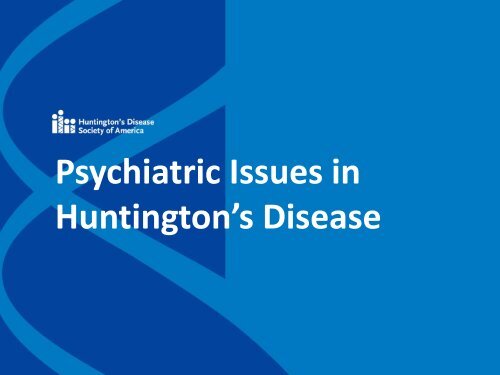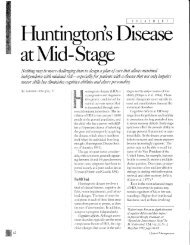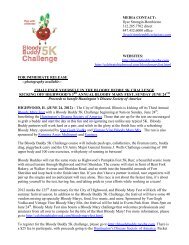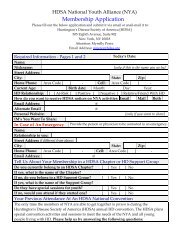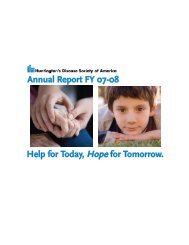Psychiatric Issues in Huntington's Disease
Psychiatric Issues in Huntington's Disease
Psychiatric Issues in Huntington's Disease
You also want an ePaper? Increase the reach of your titles
YUMPU automatically turns print PDFs into web optimized ePapers that Google loves.
<strong>Psychiatric</strong> <strong>Issues</strong> <strong>in</strong><br />
Hunt<strong>in</strong>gton’s <strong>Disease</strong>
Arik Johnson, PsyD<br />
HDSA Center of Excellence at UCLA<br />
June 24, 2011<br />
26th Annual HDSA Conference<br />
M<strong>in</strong>neapolis, MN
• The <strong>in</strong>formation provided by speakers <strong>in</strong> workshops, forums,<br />
shar<strong>in</strong>g/network<strong>in</strong>g sessions and any other educational<br />
presentation made as part of the 2011 HDSA convention program<br />
is for <strong>in</strong>formational use only<br />
• HDSA encourages all attendees to consult with their primary care<br />
provider, neurologist or other healthcare provider about any<br />
advice, exercise, medication, treatment, nutritional supplement or<br />
regimen that may have been mentioned as part of any<br />
presentation
Presenter Disclosures<br />
Arik Johnson, PsyD<br />
The follow<strong>in</strong>g personal f<strong>in</strong>ancial relationships with commercial<br />
<strong>in</strong>terests relevant to this presentation existed dur<strong>in</strong>g the past 12<br />
months:<br />
No relationships to disclose
Objectives<br />
• Discuss psychiatric issues that may arise <strong>in</strong> the early stages of<br />
Hunt<strong>in</strong>gton’s <strong>Disease</strong> (HD)<br />
• Discuss ways to identify signs and symptoms of common<br />
psychiatric disorders<br />
• Explore the impact of psychiatric issues <strong>in</strong> the early stages of HD<br />
• Review medications used <strong>in</strong> treat<strong>in</strong>g psychiatric issues<br />
• Provide suggestions for non-medic<strong>in</strong>al cop<strong>in</strong>g strategies for<br />
psychiatric issues
<strong>Psychiatric</strong> <strong>Issues</strong> <strong>in</strong> HD<br />
• <strong>Psychiatric</strong> issues that can be seen <strong>in</strong> early stages of HD<br />
• Depression<br />
• Suicide<br />
• Anxiety disorders<br />
• Apathy<br />
• Irritability and anger<br />
• Psychotic disorders and symptoms can develop over the course of the<br />
disease and <strong>in</strong>clude symptoms like delusions and halluc<strong>in</strong>ations, but tend<br />
to be less common <strong>in</strong> the earlier stages of HD<br />
• <strong>Psychiatric</strong> disorders are treatable<br />
• Psychotic symptoms can be more difficult to treat<br />
• NOTE: the psychiatric issues seen <strong>in</strong> HD can be complicated by<br />
the cognitive issues seen <strong>in</strong> HD
<strong>Psychiatric</strong> <strong>Issues</strong> <strong>in</strong> HD<br />
• Treatment is the same as the typical <strong>in</strong>terventions for all HD<br />
symptoms<br />
• Pharmacological<br />
• Based on symptom reduction<br />
• Pharmacological <strong>in</strong>terventions for psychiatric symptoms are<br />
effective, but only address the biological component of the<br />
problem<br />
• Behavioral <strong>in</strong>terventions are <strong>in</strong>dicated to create livable situations<br />
with patients and their families<br />
• Studies show that best treatment is a comb<strong>in</strong>ation of:<br />
pharmacology + cop<strong>in</strong>g strategies
<strong>Psychiatric</strong> <strong>Issues</strong> <strong>in</strong> HD<br />
• Keep <strong>in</strong> m<strong>in</strong>d:<br />
• The behavioral symptoms talked about today are GENERAL<br />
• Every person is different so behavioral symptoms will present<br />
differently<br />
• Treatment and care plans should be unique to fit each person<br />
• ALWAYS consult with your medical doctor about medication<br />
treatments<br />
• HD doctors: neurologists, psychiatrists, <strong>in</strong>ternists<br />
• IF POSSIBLE work with a mental health specialist <strong>in</strong> plann<strong>in</strong>g<br />
behavioral <strong>in</strong>terventions<br />
• Psychologists, LCSWs, MFTs, counselors
<strong>Psychiatric</strong> <strong>Issues</strong> <strong>in</strong> HD<br />
• Reactionary vs. Neurophysiological<br />
• Reactionary<br />
• Saddened mood as a result of changes <strong>in</strong> level of function<br />
• Anxiety as a result of job <strong>in</strong>stability<br />
• Neurophysiological<br />
• Changes <strong>in</strong> the bra<strong>in</strong> lead<strong>in</strong>g to depression or other disorders<br />
• HD is neurodegenerative, which means that it is a progressive and<br />
ever chang<strong>in</strong>g disease<br />
• We will treat the symptoms the same way
Depression<br />
• Signs and symptoms of Depression:<br />
• Depressed mood most of the day, nearly every day<br />
• Decreased ability to f<strong>in</strong>d pleasure or <strong>in</strong>terest <strong>in</strong> usual activities<br />
• Changes <strong>in</strong> appetite or weight<br />
• Either <strong>in</strong>creased or decreased<br />
• Sleep<strong>in</strong>g all day or rarely sleep<strong>in</strong>g<br />
• Loss of energy, always tired<br />
• Excessive feel<strong>in</strong>gs of unworth<strong>in</strong>ess or guilt<br />
• Difficulties th<strong>in</strong>k<strong>in</strong>g, concentrat<strong>in</strong>g, or mak<strong>in</strong>g decisions<br />
• Thoughts of death or suicide<br />
• American <strong>Psychiatric</strong> Association. (2000). Diagnostic and statistical manual of mental disorders (Revised 4th ed.).<br />
Wash<strong>in</strong>gton, DC: Author.
Impact of Depression<br />
John is a 42 year old man who works at a local warehouse.<br />
Recently, his boss <strong>in</strong>dicated that the company would be<br />
downsiz<strong>in</strong>g because of decreased bus<strong>in</strong>ess. John is conv<strong>in</strong>ced he<br />
will be los<strong>in</strong>g his job when the layoffs start. Even though he hasn't<br />
said anyth<strong>in</strong>g about hav<strong>in</strong>g HD, he’s worried that his boss knows<br />
that it is harder now for John to keep th<strong>in</strong>gs runn<strong>in</strong>g smoothly.<br />
There was also that big screw up a couple of weeks ago which was<br />
all John’s fault. Th<strong>in</strong>gs aren’t much better at home. John’s not<br />
play<strong>in</strong>g with his kids as much as he used to, never m<strong>in</strong>d that he’s<br />
barely got the energy to do his chores. As for his relationship with<br />
his wife, well…
Treat<strong>in</strong>g Depression<br />
• Psychopharmacology:<br />
• Selective seroton<strong>in</strong> reuptake <strong>in</strong>hibitors (SSRIs)<br />
• Citalopram (Celexa)<br />
• Escitalopram (Lexapro)<br />
• Fluoxet<strong>in</strong>e (Prozac)<br />
• Paroxet<strong>in</strong>e (Paxil)<br />
• Sertral<strong>in</strong>e (Zoloft)<br />
• Selective Seroton<strong>in</strong> and Norep<strong>in</strong>ephr<strong>in</strong>e Reuptake Inhibitors (SNRIs)<br />
• Desvenelafax<strong>in</strong>e (Pristiq)<br />
• Duloxet<strong>in</strong>e (Cymbalta)<br />
• Venalfaxim<strong>in</strong>e (Effexor)
Treat<strong>in</strong>g Depression<br />
• Psychopharmacology (cont<strong>in</strong>ued):<br />
• Atypical Antidepressants<br />
• Buproprion (Wellbutr<strong>in</strong>)<br />
• Buspirone (Buspar)<br />
• Mirtazep<strong>in</strong>e (Remeron)<br />
• Other agents<br />
• Aripiprazole (Abilify)
Treat<strong>in</strong>g Depression<br />
• Cop<strong>in</strong>g Strategies (aka Behavioral Interventions)<br />
• Talk about it!<br />
• Talk to your doctor about medications<br />
• Work with a mental health care professional<br />
• F<strong>in</strong>d a support group<br />
• Encourage activities<br />
• Exercise<br />
• Hobbies<br />
• Try to ma<strong>in</strong>ta<strong>in</strong> rout<strong>in</strong>es and schedules<br />
• Monitor suicidal thoughts<br />
• Keep your doctor or counselor <strong>in</strong> the loop
Suicide and HD<br />
• Suicide occurs <strong>in</strong> 2.3% to 5.7% of persons with HD, a rate four to<br />
five times greater than that <strong>in</strong> the general population (Hask<strong>in</strong>s &<br />
Harrison, 2000)<br />
• Impulsivity and anger management problems create the highest<br />
suicide risk and complicate assess<strong>in</strong>g, predict<strong>in</strong>g and prevent<strong>in</strong>g<br />
suicides<br />
• TALK about it!<br />
• Use your treatment resources: MDs, Psychiatrists, Psychologists,<br />
Social Workers, etc<br />
• Create behavioral management plans to manage these symptoms
Anxiety Disorders<br />
• Anxiety can be thought of as a family of disorders, <strong>in</strong>clud<strong>in</strong>g:<br />
• Anxiety (or excessive, generalized worry)<br />
• Social Anxiety<br />
• Obsessive Compulsives-type features<br />
• While we can see dist<strong>in</strong>ct disorders present <strong>in</strong> HD, there are often<br />
“features” - or pieces of – these different disorders
Anxiety Disorders<br />
• Signs and symptoms of Anxiety<br />
• Excessive anxiety and worry, occurr<strong>in</strong>g more days than not<br />
• Difficulty controll<strong>in</strong>g the worry<br />
• Physical symptoms <strong>in</strong>clud<strong>in</strong>g:<br />
• Restlessness or feel<strong>in</strong>g keyed up or on edge<br />
• Be<strong>in</strong>g easily fatigued<br />
• Difficulty concentrat<strong>in</strong>g or m<strong>in</strong>d go<strong>in</strong>g blank<br />
• Irritability<br />
• Muscle tension<br />
• Sleep disturbances (difficulty fall<strong>in</strong>g or stay<strong>in</strong>g asleep, restless or<br />
unsatisfy<strong>in</strong>g sleep)<br />
• American <strong>Psychiatric</strong> Association. (2000). Diagnostic and statistical manual of mental disorders (Revised 4th ed.).<br />
Wash<strong>in</strong>gton, DC: Author.
Anxiety Disorders<br />
• Signs and symptoms of Social Anxiety<br />
• Fear of one or more social situations <strong>in</strong> which the <strong>in</strong>dividual is<br />
exposed to unfamiliar people or to possible scrut<strong>in</strong>y by others<br />
• The <strong>in</strong>dividual fears that he or she will act <strong>in</strong> a way (or show anxiety<br />
symptoms) that will be humiliat<strong>in</strong>g or embarrass<strong>in</strong>g<br />
• American <strong>Psychiatric</strong> Association. (2000). Diagnostic and statistical manual of mental disorders (Revised 4th ed.).<br />
Wash<strong>in</strong>gton, DC: Author.<br />
• Signs and symptoms of Obsessive Compulsive-type Features<br />
• Repetitive thoughts about troublesome topics<br />
• Obsessive preoccupations with specific thoughts or rout<strong>in</strong>es<br />
• Engag<strong>in</strong>g <strong>in</strong> repetitive behaviors<br />
• Perseveration (repetition and then some)
Impact of Anxiety Disorders<br />
Joanie is a 33 year old woman liv<strong>in</strong>g with HD. She works as a high<br />
school teacher and recently decreased her schedule to part time.<br />
It seems like every quarter it is gett<strong>in</strong>g harder for her to manage<br />
her classroom. Joanie worries that the kids are not respect<strong>in</strong>g her<br />
and that she isn’t talk<strong>in</strong>g to them the right way and that she is<br />
giv<strong>in</strong>g them too hard of homework and that she isn’t able to keep<br />
up with demands of the students like she used to and that she will<br />
have to br<strong>in</strong>g work home on the weekends and that her friends<br />
and family will quit ask<strong>in</strong>g her to go out s<strong>in</strong>ce she always has to<br />
work and…
Treat<strong>in</strong>g Anxiety Disorders<br />
• Psychopharmacology:<br />
• Antidepressant Medications (SSRIs and SNRIs)<br />
• See previous list<br />
• Benzodiazep<strong>in</strong>es (look out for abuse or addiction)<br />
• Clonazepam (Klonop<strong>in</strong>)<br />
• Alprazolam (Xanax)<br />
• Diazepam (Valium)<br />
• Lorazepam (Ativan)<br />
• Neuroleptics<br />
• Olanzap<strong>in</strong>e (Zyprexa)<br />
• Quetiap<strong>in</strong>e (Seroquel)<br />
• Risperidone (Risperdal)
Treat<strong>in</strong>g Anxiety Disorders<br />
• Cop<strong>in</strong>g Strategies:<br />
• Talk about it!<br />
• Cognitive Behavioral Therapy (CBT) has been shown to be extremely<br />
helpful for people with anxiety disorders – talk to a counselor<br />
• The tips that follow are derived from CBT<br />
• Identify any triggers for anxiety (ie: work demands, f<strong>in</strong>ances, visit<strong>in</strong>g<br />
family, etc.)<br />
• Identify the thoughts that come up when faced with a trigger<br />
• Challenge problematic thoughts (ie: be<strong>in</strong>g conv<strong>in</strong>ced someth<strong>in</strong>g bad<br />
is go<strong>in</strong>g to happen) with more realistic thoughts (ie: what is the<br />
realistic probability of _____ happen<strong>in</strong>g?”)<br />
• Utilize positive self-statements (ie: “I can do this,” or “It will be ok.”)<br />
• Practice relaxation tra<strong>in</strong><strong>in</strong>g exercises, meditation, or stress reduction<br />
techniques
Apathy<br />
• Signs and symptoms of Apathy<br />
• Lack<strong>in</strong>g an emotional <strong>in</strong>vestment <strong>in</strong> activities and surround<strong>in</strong>gs<br />
• Disengaged<br />
• Difficulty <strong>in</strong> <strong>in</strong>itiat<strong>in</strong>g behaviors or activities<br />
• “Hard to get started”<br />
• Sluggishness<br />
• Apathy can be hard to differentiate from depression<br />
• Please note, the apathetic person isn’t necessarily depressed<br />
• Apathy and depression often co-exist
Impact of Apathy<br />
Dave is a 38 year old I.T. manager and a “lifelong” baseball…<br />
excuse me, Dodgers fan. He and his brother have watched games<br />
together and talked baseball stats for years. Over the past two<br />
seasons, however, Dave has been less <strong>in</strong>vested <strong>in</strong> the games and<br />
doesn’t always seem to be listen<strong>in</strong>g when his brother tries to talk<br />
to him about a play that just happened. Dave has also decl<strong>in</strong>ed<br />
tickets to a couple of home games, which upset his brother when<br />
he found out - well after the fact. Dave’s brother got angry and<br />
rem<strong>in</strong>ded Dave about how much fun they’d had just a month ago<br />
at a game they’d gone to with his brother’s work friends.
Treat<strong>in</strong>g Apathy<br />
• Psychopharmacology:<br />
• Antidepressant Medications (SSRIs and SNRIs)<br />
• See previous list<br />
• Psychostimulant Medications<br />
• Atomoxet<strong>in</strong>e (Strattera)<br />
• Dexotroamphetam<strong>in</strong>e (Dexedr<strong>in</strong>e)<br />
• Methylphenidate (Rital<strong>in</strong>)<br />
• Modaf<strong>in</strong>il (Provigil)
Treat<strong>in</strong>g Apathy<br />
• Cop<strong>in</strong>g Strategies:<br />
• Do NOT <strong>in</strong>terpret apathy as “laz<strong>in</strong>ess”<br />
• Educate family and friends about the <strong>in</strong>dividual’s <strong>in</strong>ability to <strong>in</strong>itiate<br />
behaviors<br />
• Support family and friends when they are deal<strong>in</strong>g with an apathetic<br />
<strong>in</strong>dividual<br />
• It can be frustrat<strong>in</strong>g!<br />
• Encourage the person to participate, but respect when you are told<br />
“no”<br />
• Use schedules, calendars, and rout<strong>in</strong>es to encourage behaviors<br />
• PLEASE NOTE: Once a person starts an activity, they often don’t have<br />
a problem participat<strong>in</strong>g
Irritability and Anger<br />
• Aggressive behaviors that create an atmosphere of fear and<br />
tension<br />
• Often related to an underly<strong>in</strong>g psychiatric diagnosis (ie:<br />
Depression)<br />
• Can be an actual expression of an <strong>in</strong>dividual’s true feel<strong>in</strong>gs<br />
exaggerated due to HD<br />
• Signs and symptoms of Irritability and Anger:<br />
• Stated feel<strong>in</strong>gs of frustration<br />
• Stubbornness<br />
• Loss of temper<br />
• Violent outbursts
Impact of Irritability and Anger<br />
Debbie, a 36 year old mother of two, is pissed off. Not only were<br />
the dishes not done like she had demanded an hour ago, but her<br />
son is nowhere to be found and her daughter is locked <strong>in</strong> her<br />
room , talk<strong>in</strong>g on the phone. Debbie hollers at her daughter to<br />
hang up, but through the door she can hear the conversation is<br />
still go<strong>in</strong>g full force. As she stomps around <strong>in</strong> the hallway, Debbie<br />
starts curs<strong>in</strong>g under her breath. She marches back to her<br />
daughter’s room and bangs on the door, rattl<strong>in</strong>g it on the h<strong>in</strong>ges.<br />
From <strong>in</strong>side, her daughter threatens to call her dad and tell him<br />
about how Debbie is act<strong>in</strong>g, which only makes her angrier.
Treat<strong>in</strong>g Irritability and Anger<br />
• Psychopharmacology:<br />
• Antidepressant Medications (SSRIs and SNRIs)<br />
• See previous list<br />
• Mood Stabilizers, Antiseizure Medications<br />
• Carbamazep<strong>in</strong>e (Tegretol)<br />
• Divalproex (Depakote)<br />
• Lamotrig<strong>in</strong>e (Lamictal)<br />
• Other agents (Neuroleptics)<br />
• Haloperidol (Haldol)<br />
• Olanzap<strong>in</strong>e (Zyprexa)<br />
• Quetiap<strong>in</strong>e (Seroquel)<br />
• Risperidone (Risperdal)
Treat<strong>in</strong>g Irritability and Anger<br />
• Cop<strong>in</strong>g Strategies:<br />
• Talk about it!<br />
• Therapy can be a great resource<br />
• Anger management strategies provide useful techniques<br />
• Identify triggers for irritability and anger<br />
• Reduce identified triggers, if feasible<br />
• Take a breath – or five<br />
• Sometimes a pause is enough to allow the situation to settle down<br />
• Restructure – or change - <strong>in</strong>teractions, expectations, and<br />
responsibilities<br />
• F<strong>in</strong>d a “happy medium” - compromise<br />
• Know when to leave the situation or seek help
Conclusion<br />
• Reviewed psychiatric issues that can arise <strong>in</strong> the early stages of<br />
Hunt<strong>in</strong>gton’s <strong>Disease</strong> (HD)<br />
• Identified common signs and symptoms of these psychiatric<br />
disorders<br />
• Looked at examples of the impact of psychiatric issues<br />
• Reviewed medications used <strong>in</strong> treat<strong>in</strong>g psychiatric issues<br />
• Discussed cop<strong>in</strong>g strategies for psychiatric issues<br />
• This talk should not be the answer to all of your questions, but it<br />
will hopefully give you someth<strong>in</strong>g to work with and encourage<br />
you to talk to your providers if you are fac<strong>in</strong>g any of these issues
Thank you!<br />
Arik Johnson, PsyD<br />
HDSA Center of Excellence at UCLA<br />
acjohnson@mednet.ucla.edu


